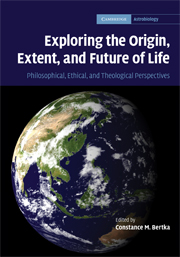 Exploring the Origin, Extent, and Future of Life
Exploring the Origin, Extent, and Future of Life Book contents
- Frontmatter
- Contents
- List of contributors
- Acknowledgements
- 1 Astrobiology in a societal context
- Part I Origin of life
- Part II Extent of life
- 7 A biologist's guide to the solar system
- 8 The quest for habitable worlds and life beyond the solar system
- 9 A historical perspective on the extent and search for life
- 10 The search for extraterrestrial life: epistemology, ethics, and worldviews
- 11 The implications of discovering extraterrestrial life: different searches, different issues
- 12 God, evolution, and astrobiology
- Part III Future of life
- Index
- References
11 - The implications of discovering extraterrestrial life: different searches, different issues
from Part II - Extent of life
Published online by Cambridge University Press: 29 December 2010
- Frontmatter
- Contents
- List of contributors
- Acknowledgements
- 1 Astrobiology in a societal context
- Part I Origin of life
- Part II Extent of life
- 7 A biologist's guide to the solar system
- 8 The quest for habitable worlds and life beyond the solar system
- 9 A historical perspective on the extent and search for life
- 10 The search for extraterrestrial life: epistemology, ethics, and worldviews
- 11 The implications of discovering extraterrestrial life: different searches, different issues
- 12 God, evolution, and astrobiology
- Part III Future of life
- Index
- References
Summary
Introduction
The search for ET life is encompassed within a broad spectrum of research efforts in the field of astrobiology. In general, this multidisciplinary field seeks to understand the origin, evolution, and fate of life in the universe. While searches for ET life represent just a subset of the overall astrobiology goals, they command a disproportionate share of the public interest. To scientists it may be obvious that finding an ET microbe on Mars would be quite different than getting a message from an intelligent civilization somewhere in the Milky Way. However, to the public, the nature and implications of different types of discoveries are probably less clear. Without a systematic analysis of the varied research efforts and a consideration of the science and issues associated with them, it is impossible to get an overview of what it would mean to discover ET life. This chapter attempts such an analysis and focuses additionally on the kinds of societal issues and concerns that need to be communicated to public audiences when discussing astrobiological research and exploration efforts, particularly those centered on searching for ET life.
When searching for ET life, astrobiology uses diverse methods to identify and study potentially habitable locations, understand their environmental conditions, analyze processes that may be associated with life, and, finally, seek evidence for ET life (which may or may not be the same as finding life itself).
- Type
- Chapter
- Information
- Exploring the Origin, Extent, and Future of LifePhilosophical, Ethical and Theological Perspectives, pp. 205 - 219Publisher: Cambridge University PressPrint publication year: 2009
References
- 2
- Cited by
